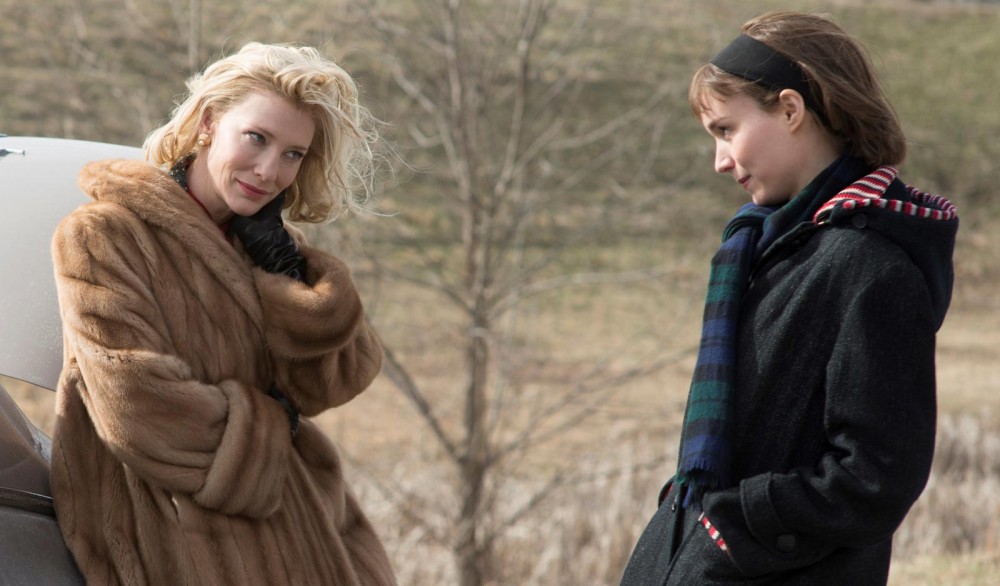
Many times in cinema, what isn’t said is infinitely more important than what is. In adapting novels, a lot of screenwriters find that it’s all about bringing the dialogue to the screen, to allow the characters to tell you what they’re thinking without always showing it in the right manner. Carol is different. It’s a film entirely fascinated by showing what its characters are experiencing rather than telling; longing glances and piercing stares being more of a communicatory factor than any words could ever be. And, this dedication to embracing visual storytelling rather than putting page to screen, is exactly why Carol is the most beautiful love story to hit the big screen in ages.
A loving adaptation of Patricia Highsmith’s The Price of Salt by writer Phyllis Nagy and director Todd Haynes, Carol tells the story of a department-store clerk named Therese (Rooney Mara) who falls in love for an older, married woman, Carol (Cate Blanchett). As with any great romance, there’s caution to be taken due to exterior factors: a former lover, a jealous boyfriend, a possessive husband, insecurity, dreams of a career, motherhood, divorce, and inexperience above all else. But everything seems frivolous in the face of true love, if that’s truly what these women are experiencing.
And Haynes does everything he can to ensure the audience that this is, in fact, true love. To say the director has a fascinating career dedicated to exploring the psyche of a variety of human beings isn’t much of a stretch—from Superstar: The Karen Carpenter Story to I’m Not There—and Carol is no different. Easier comparisons than those two can be drawn here though, with Far From Heaven and Mildred Pierce working as companion pieces to Carol in style (and content to an extent). There’s a clear notion of this being another time without ever coming across as overwhelmingly tailored to be gorgeous; the costuming, the production design, the hair, the make-up, everything is effortlessly presented, as though one is looking at a picture that might have actually been taken at the time. Essential to creating that atmosphere is the fact that the film was shot on 16mm, which adds a warmth to the snowiest of moments, enhancing the narrative as much as the aesthetic.
Hagy’s script, too, is a work of wonder. In adapting the novel, she focuses on making the relationship between Carol and Therese come across as naturally as possible. Without Therese’s inner monologue, which is essentially what The Price of Salt is, Hagy instead offers just the right selection of dialogue between the women to solidify that love can bloom, while simultaneously moving along the plot. Where she can’t include a ponderous quote—like “What was it to love someone, what was love exactly, and why did it end or not end? Those were the real questions, and who could answer them?”—she instead allows the filmmaker to express such thoughts visually, instead offering up the simple words and moments that make the two fall in love with each other: “I like the hat,” “I’m not alone this year”, “Ask me things, please”, “You don’t have to sleep over there.”
It’s not that the actresses don’t make each and every word Therese and Carol say to each other land with an air of sensuality that most real conversations could never amount to; it’s that Haynes is preoccupied with letting his actresses use their expressions to their fullest potential and using his camera to capture every emotionally charged look across a room. Blanchett and Mara are a duo to reckon with, and while many will claim the former to be the better of the pair, their performances only work because they complement each other perfectly. One is naive, always looking at the other with admiration, and one is experienced and wary, but allowing herself to enjoy life, and love, for the first time in years. The fondness for Blanchett’s performance as the titular character comes partially because of the way Haynes and Nagy offer more insight into Carol’s life than Highsmith’s novel does, but mostly because they frame her as someone to admire, to love, just as Therese does. And, well, a heart-wrenching reading of the film’s sole monologue style entry in the form of a letter along with a final frame that could kill certainly helps.
Haynes and director of photography Edward Lachman ensure that the camera lingers in the least voyeuristic manner possible, presenting the unfolding romance not as something tawdry, but as something to wish one could experience themselves. It’s a rare showcase of a queer romance presented in a respectful manner, without any tragedy or scandal, almost as unseen today as it was when Highsmith published The Price of Salt in the fifties. Shots of Therese glancing at Carol’s hands across a steering wheel or smelling her perfume are as powerfully presented as a moment of true passion, with Carter Burwell’s affectionate, though sometimes melancholy, score never coming across as intrusive.
It’s hard to separate myself as a critic from a work of art such as this, as Carol is a particularly special and rare instance where queer individuals craft a queer film entirely made for an audience that doesn’t need to be spoon-fed a cautious queer narrative. It exists as a pure tale of romance through a queer lens, untouched by a heterosexual gaze looking to fetishize the love between two women to score an Oscar or two. Imagining this tale presented any other way is impossible, just as imagining myself loving any film as much as I love this one this year is impossible. As Patricia Highsmith wrote, “It would be Carol, in a thousand cities, a thousand houses, in foreign lands where they would go together, in heaven and in hell.”
—
Directed by Todd Haynes; written by Phyllis Nagy; based on Patricia Highsmith’s novel The Price of Salt; starring Cate Blanchett, Rooney Mara, Sarah Paulson, Kyle Chandler, Jake Lacy, Cory Michael Smith, and Carrie Brownstein; 118 minutes.
Carol is currently experiencing a limited theatrical release. In Miami, the film opened at the Coral Gables Art Cinema on Christmas Day and O Cinema Miami Beach on January 8th. Producer Christine Vachon will be having a Q&A on February 12th at the Cosford Cinema after a screening of the film.



 Derek
Derek
 Isabelle
Isabelle